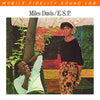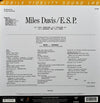





Miles Davis - E.S.P. (2LP, Ultra Analog, Half-speed Mastering, 45 RPM)
ORDER LIMITED TO ONE ITEM PER CUSTOMER
Miles Davis – trumpet [click here to see more vinyl featuring Miles Davis]
Wayne Shorter – tenor saxophone [click here to see more vinyl featuring Wayne Shorter]
Herbie Hancock – piano [click here to see more vinyl featuring Herbie Hancock]
Ron Carter – bass [click here to see more vinyl featuring Ron Carter]
Tony Williams – drums
2 LPs, gatefold jacket
Numbered limited edition
Original analog Master tape : YES
Half-speed Mastering
Gain 2™ Ultra Analog
Heavy Press : 180g
Record color : black
Speed : 45RPM
Size : 12”
Stereo
Studio
Record Press : RTI
Label : MOFI
Original Label : Columbia
Recorded January 20–22, 1965 at Columbia Studios, Hollywood
Produced by Irving Townsend
Remastered by Krieg Wunderlich
Originally released in 1965
Reissued in 2016
Tracks:
Side A :
- E.S.P.
- Eighty-One
Side B :
- Little One
- R.J.
Side C :
- Agitation
- Iris
Side D :
- Mood
Awards:
TAS Super LP List! Special Merit: Informal
Reviews :
"ESP marks the beginning of a revitalization for Miles Davis, as his second classic quintet -- saxophonist Wayne Shorter, pianist Herbie Hancock, bassist Ron Carter, and drummer Tony Williams -- gels, establishing what would become their signature adventurous hard bop. Miles had been moving toward this direction in the two years preceding the release of ESP and he had recorded with everyone outside of Shorter prior to this record, but his addition galvanizes the group, pushing them toward music that was recognizably bop but as adventurous as jazz's avant-garde. Outwardly, this music doesn't take as many risks as Coltrane or Ornette Coleman's recordings of the mid-'60s, but by borrowing some of the same theories -- a de-emphasis of composition in favor of sheer improvisation, elastic definitions of tonality -- they created a unique sound that came to define the very sound of modern jazz. Certainly, many musicians have returned to this group for inspiration, but their recordings remain fresh, because they exist at this fine dividing line between standard bop and avant. On ESP, they tilt a bit toward conventional hard bop (something that's apparent toward the end of the record), largely because this is their first effort, but the fact is, this difference between this album and hard bop from the early '60s is remarkable. This is exploratory music, whether it's rushing by in a flurry of notes or elegantly reclining in Hancock's calm yet complex chords. The compositions are brilliantly structured as well, encouraging such free-form exploration with their elliptical yet memorable themes. This quintet may have cut more adventurous records, but ESP remains one of their very best albums." AllMusic Review by Stephen Thomas Erlewine
Ultra Analog™ : The GAIN 2 Ultra Analog™ Series stems from the use of the Gain 2 system, mastered at half speed from the original master tapes where possible, capturing and uncovering as before undiscovered sonic information.
Half-speed mastering. In half-speed mastering, the whole process is slowed down to half of the original speed. A typical 33 1/3 rpm record is cut at 16 2/3 rpm. The source material is also slowed down (reducing the pitch in the process) meaning the final record will still sound normal when played back. Slowing the whole process down allows more time, which means the end result sounds better and is more efficient — allowing engineering to minimize the effects of inherent limitations within the vinyl format. The result is a more accurate and more open high-frequency response in the half speed vinyl when compared with a normal speed recording.
Ratings :
AllMusic : 4,5 / 5 , Discogs : 4,51 / 5




